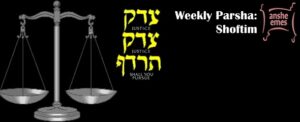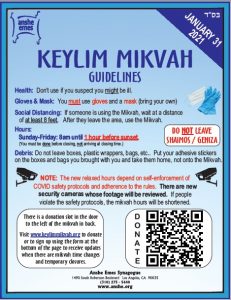SHOFTIM
I. Summary
A. Judicial System. Moshe reviewed the regulations needed to ensure the conditions for a civilized society. Local judges and officers were to be appointed in each city, and justice was to administered righteously and impartially. A judge was strictly forbidden to show bias or accept a bribe. If the local judge found a case too difficult to decide, he was to refer it to a higher authority (i.e., the Koheinim and Supreme Court sitting at the Court of the Sanctuary), whose decision was final (with refusal to abide by their verdict punishable by death).
B. The crime of idolatry. The crime of idolatry, determined after a thorough inquiry, was to be punished by death by stoning. The accused couldn’t be condemned by the testimony of a single witness alone; rather, the testimony of at least two witnesses was required (and these witnesses were to be the first to carry out the execution).C. Qualifications of a king. Moshe noted that a time would come when the people might desire a king to rule over them, as did other nations. When this occurred, the king was to be a native Israelite chosen by Hashem, who was not to misuse his powers to amass many horses, maintain a harlem or accumulate great wealth. He was to handwrite a copy of the Torah, so that he would be G-d-fearing and Torah observant.
D. The Koheinim. After enumerating the gifts that the Koheinim were to receive for their sustenance, Moshe ruled that if a Kohein from another city came to the Sanctuary, he could minister together with the Koheinim already there and share in the dues they received.
E. Superstition/magic. The Torah forbids all form of superstition and “magic” practiced by the soothsayer. Israel has no reason to resort to such tricks, for Hashem would provide inspired prophets from among them to communicate His will. False prophets speaking in the name of idols were to be punished by death. The false seer could be distinguished from the true one by non-fulfillment of his predictions.
F. Theft. Removing a landmark to enlarge one’s own estate constitutes theft.
vii. Witnesses’ Testimony. Before one can be convicted, his crime must be confirmed by at least two witnesses. If a witness was shown to have given false testimony, he received the punishment intended for the defendant.G. Exemptions from military service. The Jews shouldn’t display fear before engaging in battle with a powerful enemy, for Hashem will protect them. Three categories of men were exempt from military service; one who had just: (a) built a new house, but hadn’t yet dedicated it; (b) planted a vineyard, but hadn’t yet enjoyed its fruit; and (c) become betrothed.
H. Rules of engagement. Before Israel attacked a hostile city, she should try to negotiate a peaceful entry, in which case the city’s inhabitants would become subservient to Israel. Only if these peace efforts failed could war be waged. If Israel was victorious, all men of the enemy were to be killed, but their women and children were to be spared. Fruit trees were not to be destroyed during a siege where there were other things available, so that they could continue to benefit the new inhabitants of the conquered city.
I. Responsibility for murder in the city. If the body of a murder victim was found in a field, and the murderer couldn’t be found, responsibility for the murder rested with the city nearest to the scene of the murder. In atonement, the Judges and Elders of the city, attacking on behalf of all of it’s inhabitants, were to slaughter a young heifer in an uncultivated valley containing a stream. They were then to wash their hands in the Koheinim’s presence, testify that they weren’t responsible, and pray for forgiveness.
II. Divrei Torah
A. Lil’mode U’lilamed (Rabbi Mordechai Katz)
The Levites’ share. The Levi’im were a “crown jewel” of Israel. Their loyalty prompted Hashem to appoint them guardians of His Sanctuary; they were considered princes of the people and models of holiness. Yet, they weren’t granted their own land in Israel, but rather had to rely on the donations and offerings of the rest of the populace. Why? Hashem knew they were worthy of special duties and tasks. However, He was concerned that if they were to cultivate their own land and raise their own crops, they would become increasingly self-centered. If they prayed for assistance, they might have only their needs in mind, and devote their service to improving their own lot. To ensure that they would continue to pray for the welfare of the entire Jewish nation, Hashem made it so their sustenance depended on the well-being of the rest of the Jews. Even princes must be aware that they can’t separate their fate from the rest of the people’s fate.
B. Peninim on the Torah (Rabbi A.L. Scheinbaum)
Responsibility for murder. The Misneh in Sottah explains that the Elders absolved themselves for blame in the death of the murder victim by showing that no one who came into their presence was allowed to leave without food or an escort. Rashi extends this concept with the interpretation that “we didn’t send him away without food, thereby forcing him to steal, through which he was killed”. Failure to exercise communal responsibility towards the unfortunate in an indictment of Jewish leadership and the entire community.
C. Love Thy Neighbor (Rabbi Zelig Pliskin)
1. We must do chesed (acts of lovingkindness) every single day. “To love your Lord . . . all of the days of your life”. The Chofetz Chaim notes that the Torah stresses that we must walk in Hashem’s ways all of the days of our life, which the Sages stress means that we must emulate His ways by bestowing kindness and compassion unto others every day. Some people mistakenly believe that if they do someone a favor, especially a major one, they have fulfilled their obligation to do chesed for the next few weeks. Thus, the Torah reminds us that the obligation of chesed applies every single day.
2. We must do everything possible to protect others from shame. “And the officers shall speak further to the people and they shall say what man is there that is fearful and fainthearted? Let him go and return to his house and not let him make the heart of his brethren faint as well as his heart.'” In addition to the three categories of men noted above who were exempt from military service, a fourth category is added — one who is fearful and fainthearted. Rabbi Yossi Hagili explains that this category refers to someone who fears that he is unworthy of being saved because of his transgressions. Rabbi Yossi adds that this is the reason why the other three categories were told to go home — if someone were to leave the ranks because of his sins, he would feel embarrassed; however, since other groups were also sent home, others wouldn’t know why he was leaving. This is truly amazing — a large number of soldiers were sent home during war time in order to save a sinner from humiliation. We must learn from this that we must do everything possible to protect people from shame. At a Pesach Seder, Rabbi Yitchak Hutner was splashed by wine inadvertently spilled by someone, staining his kittel (the white robe worn by many at the Seder). To save the other person from shame, Rabbi Hutner immediately said “a kittel from the Seder not stained with wine is like a Yom Kippur Machzor (prayer book) not wet with tears.”
D. Growth Through Torah (Rabbi Zelig Pliskin)
1. Be a judge of your own behavior before the behavior of others. “Judges and police you shall place for yourself”. Rabbi Simcha Bunim commented “that is, before you make judgements about other people, judge yourself first”. As the Sages said, “first correct yourself and only then correct others”.
2. Regardless of how wise you are, if you are biased you will not be objective and will not be able to see the total truth. “For bribery blinds the eyes of wise men”. There is no greater bias than our desire to see ourselves in a positive light; we do not want to see any fault in ourselves and like to believe that we are full of virtues. This bias prevents us from taking a honest look at ourselves and objectively finding our faults and limitations. But self-improvement is the goal of our existence, and because it is so important we must force ourselves to reject the “bribe” of our own bias. Make every effort to view your life as that of a total stranger — only when you can honestly see who and where you are can you grow spiritually and improve your character traits.
E. Majesty of Man (Rabbi A. Henach Leibowitz)
Preparing the way. “You should prepare the way so that every murderer should flee there”. The Torah implores the Jews to “prepare the way” for the unintentional murderer to reach the safe haven of the City of Refuge. Thus, they prepared road signs that pointed the way to the nearest City of Refuge. The Talmud (in Makkos) states that just as Hashem shows the way for the unintentional murderer, He certainly does the same for the righteous. Hashem places “road signs” for all of us, directing us to the correct path to follow for a successful life. When the unintentional murderer came to a fork in the road, the sign pointed him in the right direction. We too have a road map — the Torah — when we reach a fork in the path of life.
F. Living Each Week (Rabbi Abraham Twerski)
Everyone is a judge. “Judges and enforcing officers shall you give unto yourself.” The words “you” and “yourself” in the Hebrew text are in the singular. This is therefore not only a communal mitzvah, i.e., to establish a judicial system, but also an order to each individual to develop a “judge” and an “enforcing officer” within himself. Every person has the obligation to sit in judgment on his own actions. There are many laws that regulate the conduct of judges. First and foremost is that a judge may not take a bribe. Regardless of how great and learned a person may be, he is not only vulnerable to the perverting effects of a bribe, but the Torah says that such distortion of judgment is inevitable. We constantly make judgments in our daily lives. Sometimes we ponder about whether to do something, and at other times we come to a conclusion to act or not act with little or no deliberation. In either case we have made a judgment and we must therefore ask ourselves, was this judgment made objectively or were we “bribed”? Whenever there is a personal interest involved, there is the potential for a “bribe.” How can we escape the risk of being misled by our personal interests? Pirkei Avos teaches, “provide yourself with a teacher, and acquire for yourself a trusted companion.” The objective opinions of people who sincerely care for us may help prevent us from being misled by ulterior motives into making decisions which are not truly just.
G. In the Garden of the Torah (the Lubavitcher Rebbe, Rabbi Menachem M. Schneerson, z’tl)
A measuring rod. Ever since his creation, man has felt the need to search for truth. Simultaneously, however, he has had to face the limits implied by his own subjectivity, and the awareness that the insights he discovers are thus limited in scope. By giving the Torah, G-d provided mankind with an absolute standard of Truth. In contrast to our subjective insights, the Torah gives us objective values — guidelines and principles that are applicable in every situation, in every place and at every time. What is man’s responsibility? To judge. To subject himself and his surroundings to scrutiny and to determine the conduct prescribed by the Torah. He should then act upon that judgment and endeavor to modify his life and environment accordingly. In this way, he elevates himself and his surroundings, lifting them into a connection with G-d that transcends human conceptions of good.




 Visit the group and request to join.
Visit the group and request to join.
